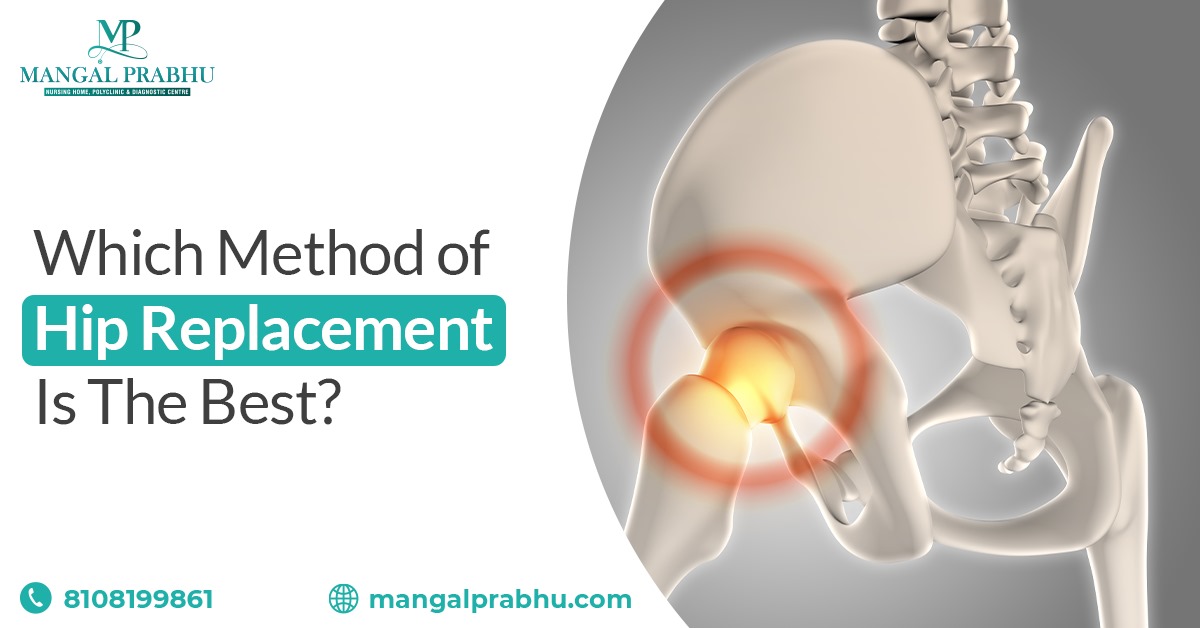
A Guide to Understanding the Recovery Time for Hip Replacement Surgery
Introduction
When it comes to recovery duration after hip replacement surgery, people are more likely to assume a more extended period than the actual recovery time. However, this guide has shed light on the recovery time and other aspects of hip replacement surgery so an individual can make a better decision before their hip surgery. Moreover, it would be best to consult with the best Hip Replacement Surgeon in Navi Mumbai from Mangal Prabhu Hospital to make a better decision regarding surgery.
Definition of Hip Replacement Surgery
Hip replacement surgery is a transformative solution for an individual suffering from the challenges of severe hip conditions. This surgical procedure helps in reducing pain and allows better flexibility, mobility, and functionality in daily work performance.
Benefits of Hip Replacement Surgery
- Patients often regain independence daily, as they can perform challenging tasks before the surgery.
- It removes the damaged part of the hip, which helps overcome chronic pain and improves quality of life.
- An individual can regain the functionality of their hip joint and can also improve mobility after the surgery. Thus, consulting with the best doctors at Mangal Prabhu Hospital for hip replacement surgery in Navi Mumbai would be the best to attain all the benefits.
Recovery Time for Hip Replacement
A. Immediate Recovery
This recovery period refers to the duration directly after the surgery when the patient is closely monitored in the hospital to avoid complications. The doctor may suggest pain management and mobility exercises during this period.
B. Short-Term Recovery
This period starts after discharge from the hospital and may last for up to six weeks. During this period, patients gradually regain mobility and begin physical therapy.
C. Long-Term Recovery
This period starts from the initial six weeks after surgery to several months or years. A patient continues therapies and other precautions to regain optimal joint function.
What to Expect During Recovery
a. Pain Management
Medications, both oral and sometimes intravenous, are prescribed to control pain levels. As healing progresses, the reliance on pain medications typically decreases.
b. Physical Therapy
Physical therapy helps in improving strength, flexibility, and joint function. Therapists guide patients through exercises that enhance mobility and stability, focusing on the hip and surrounding muscles.
c. Diet and Nutrition
A balanced diet rich in nutrients and an adequate protein intake supports muscle recovery, while vitamins and minerals contribute to overall health.
Tips for a Smooth Recovery
i. Follow the Directions of the Doctor and Physical Therapist
Adhering to the recommendations and instructions provided by the medical team is crucial. It includes taking medications as prescribed, attending physical therapy sessions, and following any activity restrictions.
ii. Listen to Your Body
It would be best to rest and perform activities according to an individual’s body needs, which helps reduce potential pain and discomfort.
iii. Maintain a Positive Mindset
Patience is vital, as improvements may be gradual. Staying optimistic and celebrating small milestones can help alleviate emotional challenges during recovery.
V. Conclusion
Hip replacement surgery offers significant benefits for individuals suffering from hip-related issues. However, it would be best to understand the recovery time and consult the best surgeon before surgery to get the best possible solution.

Which Method Of Hip Replacement Is The Best?
Introduction
Hip replacement surgery is a common orthopedic procedure to relieve pain and improve mobility in individuals with hip joint issues. However, with various methods available, patients often wonder which is the best approach for their specific condition. Here, you can explore different types of hip replacement procedures and their advantages and disadvantages. It will help you understand which hip replacement method is most suitable for you.
Different Types of Hip Replacement Procedures
Hip replacement surgery offers several approaches tailored to the patient’s condition and requirements. The three primary methods are:
1. Total Hip Replacements
Total hip replacements involve replacing the hip joint’s ball and socket with prosthetic components. This procedure is suitable for patients with severe arthritis, joint degeneration, or significant damage to the hip joint.
2. Partial Hip Replacements
Partial hip replacements, also known as hip hemiarthroplasty, involve replacing only the damaged or diseased portion of the hip joint, typically the ball component. This method is often chosen for specific hip fractures or conditions that affect only one part of the hip joint.
3. Revision Hip Replacements
Revision hip replacements are performed when a previous hip replacement has failed or needs to be replaced due to various reasons, such as wear and tear of the prosthetic components or infection.
Advantages and Disadvantages of Each Method
Each method of hip replacement has its unique advantages and disadvantages:
Advantages of Total Hip Replacements
- Effective for severe hip joint damage.
- Provides long-term relief from pain and improved joint function.
- Suitable for various hip conditions, including osteoarthritis and rheumatoid arthritis.
Also Read: Lifetime Precautions After A Hip Replacement
Disadvantages of Total Hip Replacements
- More extensive surgery with longer recovery time.
- Greater risk of dislocation.
Advantages of Partial Hip Replacements
- Smaller incisions and less bone removal lead to quicker recovery.
- Reduced risk of dislocation.
- Suitable for specific hip fractures or localized joint damage.
Disadvantages of Partial Hip Replacements
- Limited applicability to certain conditions.
- It may require a second surgery if the entire joint deteriorates over time.
Advantages of Revision Hip Replacements
- Corrects issues with previous hip replacements.
- Replaces worn or damaged prosthetic components.
- Restores joint function.
Disadvantages of Revision Hip Replacements
- It is more complex than primary hip replacements.
- Longer recovery and rehabilitation.
Which Method of Hip Replacement is the Best?
The choice of the best method of hip replacement depends on individual factors, such as the patient’s age, the severity of the hip condition, and the surgeon’s assessment. There is no one-size-fits-all answer to this question, as what works for one patient may not be suitable for another. The decision should be made in consultation with an experienced hip replacement surgeon, such as a Hip Replacement Surgeon in Navi Mumbai at Mangal Prabhu Hospital. A skilled surgeon will conduct a thorough evaluation, consider the patient’s needs, and recommend the most appropriate treatment method.
Conclusion
In conclusion, there is no definitive answer to which hip replacement method is the best, as it varies from patient to patient. The choice depends on individual circumstances and the expertise of the surgeon. What is essential is that patients seek expert care from facilities like Mangal Prabhu Hospital, which specializes in Hip Replacement Surgery in Navi Mumbai. With the guidance of experienced professionals, patients can receive the most suitable hip replacement procedure to improve their overall quality of life.
